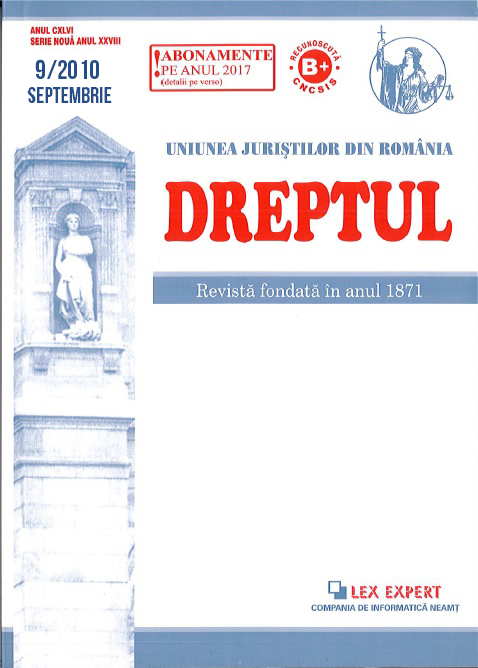By this study we aimed to proceed to a configuration of the notion of „criminal case”, used by the legislator in Article 29 (1) i) of the Government Emergency Ordinance No 80/2013 on the judicial stamp duties, taking into account in our approach in a correlated way, on the one hand, the case law of the Constitutional Court, of the High Court of Cassation and Justice and of the other courts of law, on the other hand, the doctrinal considerations on the mentioned article, and of the institutions with which the notion necessarily interacts.
The approached topic has an inter-institutional nature, because it is necessary, for its correct approach, to resort to legal institutions dealt with by the criminal procedural law (the criminal action, the solutions pronounced in a criminal file, the subjects of the criminal proceedings, etc.), but, of course, the civil procedural law (the civil action, the establishment of judicial stamp duties, the cause of the application for summons, etc.).
We consider that the present article presents first of all a practical interest, because, in the activity of the courts of law, the interpretation of Article 29 (1) i) of the Government Emergency Ordinance No 80/2013 is divergent and non-unitary, due to an acute lack of terminological unity, and this deficiency can be reflected in an impairment of the quality of the act of justice and, further, in a decrease of the citizen’s trust in justice. The article is structured in two essential parts, the first with a general character that includes the sections „Introductory Considerations”, „Arising the questioning” and „Interpretation Tools”, and the second with a special, applied character, that includes the sections „The situation in which the civil action is exercised separately before the civil court after the criminal file has been solved in the criminal investigation phase by a solution of dismissal or abandonment of the criminal prosecution”, „The situation in which the civil action is exercised separately before the civil court without having ordered a solution within the criminal file” and Conclusions”.
It should be emphasized that, in order to formulate the answer to the approached subject, our thought was oriented, first of all, to those for whom the act of justice is done – the citizens –, proposing solutions that in our vision correspond to some requirements of fairness and equality before the law.
Likewise the topic subject to discussion was not approached in an exhaustive way, being only the starting point in the debates on this topic that are taking place and, of course, that will further take place.
We have tried to prove that there is a „criminal case”, within the meaning of the mentioned text, only when the basis of legal actions, be they civil or criminal, is a deed provided by the criminal law (essence condition) for which the initiation of the criminal action was ordered (condition of nature). Finally, we consider that the variant of the proposed interpretation will also have the effect of discouraging processual or abusive conduct, reflected in the purely formal notification of the criminal prosecution bodies only in order to benefit from an exemption from the payment of the judicial stamp duties before civil courts, which thus diverts the analyzed legal provision from the purpose considered by the legislator at the time of its enactment.
UNELE CONSIDERAȚII PE MARGINEA NOȚIUNII DE „CAUZĂ PENALĂ” ÎN SENSUL ART. 29 ALIN. (1) LIT. I) DIN ORDONANȚA DE URGENȚĂ A GUVERNULUI NR. 80/2013
15.00lei


